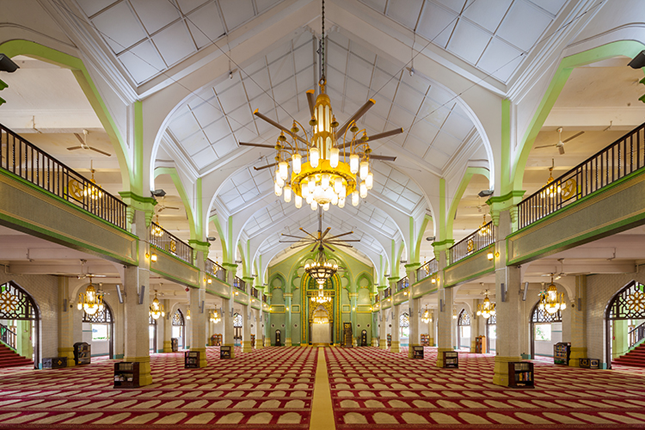Memoir Eng
Chapter 52: My Memory in Singapore
“I’d like to introduce Ustaz Abdul Rahman, he’s also an Islamic Medina University alumnus. Maybe he is your senior.” One of the al-Ghufran Mosque in Singapore committee members said to Zulkifli. The journey from Negeri Sembilan to Johor, then onboard the train to Singapore is among new experiences that Zul had throughout his career. They stopped by to pray Zohor at al-Ghufran Mosque and managed to have a chat and get to know the Malay Muslim community there.
He and several of his colleagues are currently in Singapore on the tour to introduce UNITI College and to teach for the Long-Distance Education Program. This program is arranged following the success of them sending a group of the first students of Islamic Studies Diploma to al-Azhar University straight to Year 3.
In Singapore, Zulkifli took the chance to meet Ustaz Ahmad Sonhadji Mohamad Milatu who is famous for his commentary book, ‘Abr al-Athir or more famously known in the Archipelago as “Al-Quran Commentary on the Radio”. He also didn’t let the opportunity to visit Singapore’s Mufti Sahibus Samahah Ustaz Syed Isa Muhammad Semait.
“I’ve been the Mufti since 1972. Although challenges will always come, especially when we are trying to form a united Muslims here, and building harmonious bridges between religions, alhamdulillah, everything is made easier by Allah SWT. What’s important is that all our asatizah are united. We have MUIS and PERGAS. Any problem arises, we’ll try to solve it properly amongst ourselves.” Ustaz Syed Isa Semait said to Zulkifli. Singapore’s Deputy Mufti, Ustaz Fatris Bakaram who was sitting beside the Mufti nodded his head in agreement.
“Ustaz Fatris, insya-Allah will be pursuing his PhD at the University of Birmingham. We want our asatizah to be fully competent and able to face any changes for the sake of Muslims here, ” He further added.
Although the conversation was short, however, every word of Singapore’s Mufti truly touched Zulkifli’s heart.
Challenges in Singapore is certainly different with the total number of Muslims less than 15%, about the same with the Christians and people without a religion, compared to the Buddhists who are more than 40%. This is followed by other religions such as Hinduism, Tao and other ancestral beliefs.
One thing that is undeniable is that Islam is a religion that brings a universal message with the purpose of channelling balanced peace and comprehensive and lasting happiness in this world and the hereafter. Rasullullah PBUH has drawn and showcased the sirah and the sunnah of his life several approaches and basic principles regarding the concept of life between Muslims and non-Muslims together. Furthermore, the companions also founded the Muslim civilization which displays the beauty of Islam when they are living with others with different faiths without neglecting the rulings of Islam.
The word al-ta’ayush (co-existence) originates from the word a’ish which means life. The word al-ta’ayush refers to a harmonious and loving life with each other. As for the terminology of al-ta’ayush, it is new and contemporary terminology. There are several scholars who present the definition and meaning of this new term. Some add to the term into ta’ayush al-silmi which means peaceful co-existence. Thus, other terms with similar meanings with ta’ayush such as al-tasamuh, al-taqarub, al-tasakun, al-takamul dan al-tajanus are also used.
Syeikh Abdullah bin Bayyah said: “Al-ta’ayush means co-existence. It is also related to cohabitation. In his opinion, according to Islam, it means we are living together with non-Muslims in a safe, peaceful environment following certain conditions and criteria.”
We should also realize that the relationship and unity between us people are related to the spirit of insaniyyah (humanity) and not on the basis of a creedal nation (al-ummah al-‘aqdiyyah). It is natural for humans to wish for peace, togetherness and justice and these are the factors that can lead us in appreciating the fiqh of co-existence in diversity. It is a necessity for all mankind to realize that no matter how different they are in terms of skin colour, race, politics and religion, they are actually brothers.
There are too many examples in the Quran of how the prophets are named as the brother of each of their people and this even includes the people who were opposing them.
وَإِلَى ثَمُودَ أَخَاهُمْ صَالِحًا
“And to Thamud [We sent] their brother Salih.” [1]
Allah SWT states:
قَالُوا أَرْجِهْ وَأَخَاهُ وَابْعَثْ فِي الْمَدَائِنِ حَاشِرِينَ
“They said, “Postpone [the matter of] him and his brother and send among the cities gatherers.” [2]
Allah SWT states:
وَإِلَى عَادٍ أَخَاهُمْ هُودًا
“And to ‘Aad [We sent] their brother Hud.” [3]
According to the above evidences, it clearly shows us that the word brother is used although at the time most of his people isn’t of the same religion as them according to what is understood. The dakwah is conveyed to them by the Messengers with wisdom and patience. Allah SWT states:
ذَٰلِكَ الَّذِي يُبَشِّرُ اللَّـهُ عِبَادَهُ الَّذِينَ آمَنُوا وَعَمِلُوا الصَّالِحَاتِ ۗ قُل لَّا أَسْأَلُكُمْ عَلَيْهِ أَجْرًا إِلَّا الْمَوَدَّةَ فِي الْقُرْبَىٰ ۗ وَمَن يَقْتَرِفْ حَسَنَةً نَّزِدْ لَهُ فِيهَا حُسْنًا ۚ إِنَّ اللَّـهَ غَفُورٌ شَكُورٌ
“It is that of which Allah gives good tidings to His servants who believe and do righteous deeds. Say, [O Muhammad], “I do not ask you for this message any payment [but] only good will through kinship.” And whoever commits a good deed – We will increase for him good therein. Indeed, Allah is Forgiving and Appreciative.” [4]
Even the history clearly recorded the words of Ibn ‘Abbas R. Anhuma:
لَوْ قَالَ لِي فِرْعَوْنُ: بَارَكَ اللَّهُ فِيكَ. قُلْتُ: وَفِيكَ
“If the Pharaoh said to me: ‘May Allah bless you.’ Surely, I’d say: “And you too.” [5]
This means the difference in belief or faith is not an issue for Muslims to accept or consider the non-Muslims as brothers, of whom we are all related to each other for we are all from Adam and Eve. Especially in the context of protecting the safety, harmony and peace of a country, certainly, this is the priority.
“Among my memory throughout my service as a Mufti, there was an issue where there was a proposal of cremation as a process to be adopted in resolving the issue of limited land in Singapore. This includes the deceased of Muslims. This happened in the 70s. I objected to the proposal. Alhamdulillah, the government accepted my objection.” The Singapore Mufti enthusiastically narrated.
Exiting the Mufti’s office, Zulkifli turned his attention to Ustaz Fatris and asked, “Ustaz, what are the best food available only in Singapore? We rarely get to come here. Hehe…”
“Don’t worry. Ustaz doesn’t have to worry about food. We’ve everything arranged. Our friend will bring you to eat the Singapore Murtabak at Zam Zam Restaurant, near the Sultan Mosque. There, Ustaz Kamaruzzaman and Ustaz Fuad will be waiting for you there.” Ustaz Fatris said as he giggled.
During their short stay in Singapore, they benefit from their time to visit the various madrasah there. There are 6 madrasah which offer early up to tertiary education which are the Madrasah Aljunied Al-Islamiah, Madrasah Irsyad Zuhri Al-Islamiah, Madrasah Alsagoff Al-Arabiah, Madrasah Alarabiah Al-Islamiah dan Madrasah Wak Tanjong Al-Islamiah. Madrasah Alarabiah Al-Islamiah and Madrasah Wak Tanjong Al-Islamiah are only for female students while the others are co-ed schools. They have an amazing education system that produced students who can communicate in both Arabic and English.
************************
Before returning home, Zulkifli stopped by to al-Ghufran Mosque once again to meet with his friend, Ustaz Jamaluddin. “Thank you to all asatizah from UNITI College. Don’t be shy and please come here again. Ustaz Zul, maybe you can come here again to deliver a sermon or have a forum together with Ustaz Fatris,” Ustaz Jamaluddin said.
Though it was a short visit to Singapore, the ukhuwwah they felt with the Muslim community here are warm and close to them. They were treated kindly and warmly. They didn’t feel isolated even when they are from different countries. The Boyan, Javanese, Malay or any other race unite on the name of Islam in Singapore. Their community may be small, but their voice is still heard from Kampong Buangkok all the way to the Parliament.
Farewell Singapore. Till we meet again!
_________________________
[5] Narrated by al-Bukhari in al-Adab al-Mufrad (1113)

